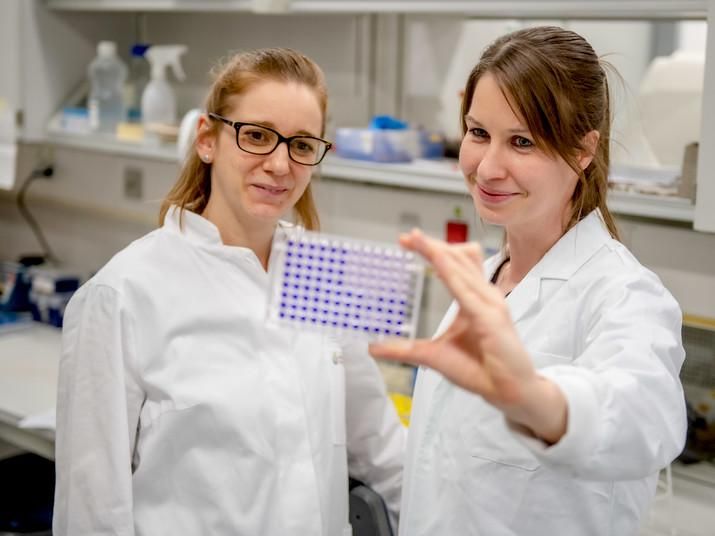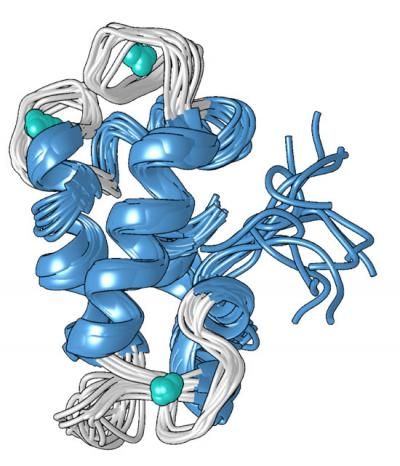Helping the body overcome Sars-Cov-2
Therapeutic application of certain interferon-alpha subtypes supports the host’s defence against Sars-Cov-2
Interferons are the host’s first line of defence against infections. Different subtypes of these messenger substances have different effects. A research team from Bochum and Essen showed which subtypes are most effective against SARS-CoV-2. The researchers not only elucidated the principles underlying the host’s defence mechanisms against the virus, but also presented potential alternative treatment options for high-risk patients in the early stages of an infection. A team headed by Professor Stephanie Pfänder from the Department of Molecular and Medical Virology at Ruhr-Universität Bochum and Dr. Kathrin Sutter from the Institute of Virology at the University Hospital Essen published their findings in the journal PNAS on 22 February 2022 online first.

Kathrin Sutter (left) and Stephanie Pfänder in the lab
© RUB, Marquard
Clinical potential not yet fully explored
As messenger substances, interferons stimulate various responses of immune cells and play a key role in activating the immune system. They are proven active agents against various diseases, especially type I interferon alpha 2, which has been widely used against hepatitis C and B. “However, there are different subtypes of interferons whose clinical potential has not yet been fully explored,” points out Stephanie Pfänder.
The researchers comprehensively analysed the cellular response to these IFN subtypes. Using transcriptome analyses, it was possible to identify key IFN-stimulated genes which were differentially regulated after exposure to a specific interferon. Their information is translated into proteins. Proteome analyses showed how the protein expression in primary lung cells changes after the stimulation with different interferons. The researchers refer to the cellular reaction caused by the interferon subtypes as immune signature.
Certain subtypes elicit particularly effective immune response
“We showed that certain interferon-alpha subtypes are highly effective against Sars-Cov-2,” states Kathrin Sutter. “The antiviral activity of the different subtypes varies considerably.” For example, the alpha-5 subtype elicited a particularly effective immune signature against the virus. The antiviral effect that the researchers measured in cell culture increased even more significantly when combined with the antiviral drug remdesivir.
“Our study allows us to draw conclusions about which induced proteins and genes are particularly important in the fight against Sars-Cov-2,” stresses Stephanie Pfänder. In addition, the findings may offer an alternative in the treatment of Covid-19 patients through the early administration of specific interferon alpha subtypes with a strong antiviral effect.
Original publication
Other news from the department science

Get the life science industry in your inbox
By submitting this form you agree that LUMITOS AG will send you the newsletter(s) selected above by email. Your data will not be passed on to third parties. Your data will be stored and processed in accordance with our data protection regulations. LUMITOS may contact you by email for the purpose of advertising or market and opinion surveys. You can revoke your consent at any time without giving reasons to LUMITOS AG, Ernst-Augustin-Str. 2, 12489 Berlin, Germany or by e-mail at revoke@lumitos.com with effect for the future. In addition, each email contains a link to unsubscribe from the corresponding newsletter.
Most read news
More news from our other portals
Last viewed contents
Encouraging results in a Phase I clinical trial in limb-girdle muscular dystrophy type 2C
Hair_tourniquet
Artificial_heart_valve
PET imaging with special tracer can detect and diagnose early Alzheimer's disease
Estrogen_insensitivity_syndrome
Adenoviridae

Visibly more movement: researchers develop new microscope for immune cells - High-throughput analysis of drug substances: 60 times faster than conventional microscopes
Spondylolisthesis






















































